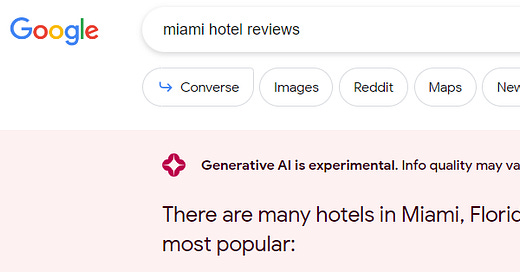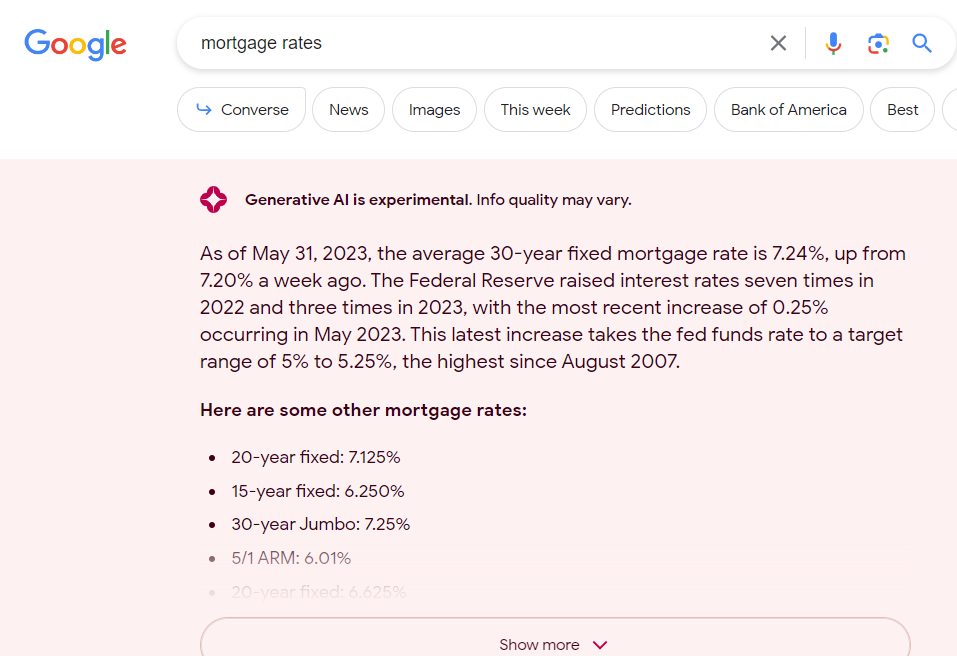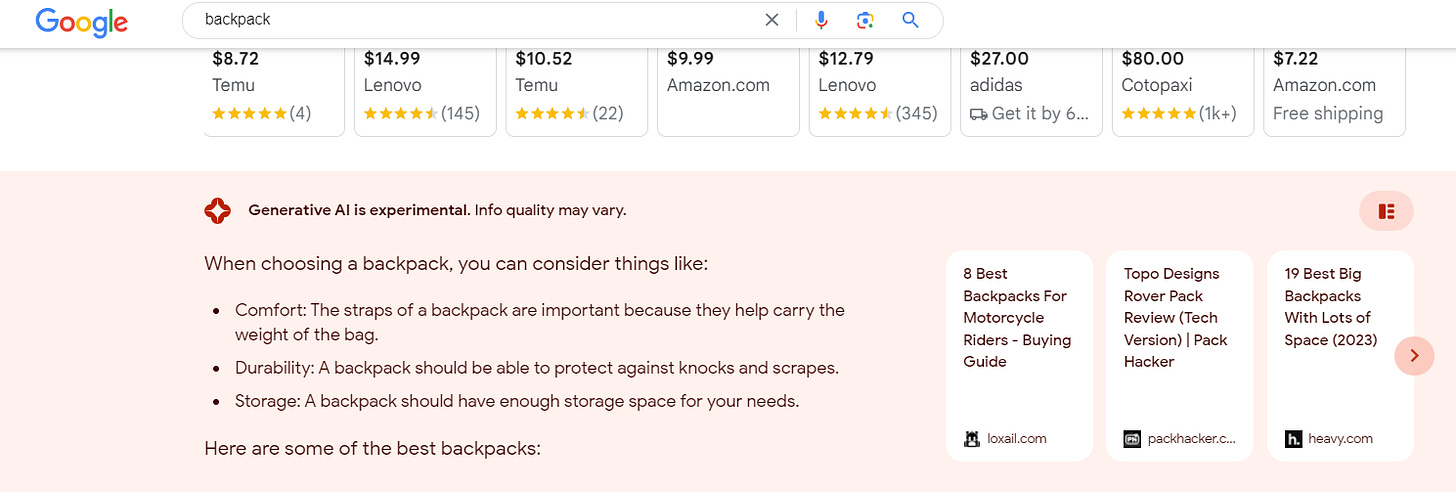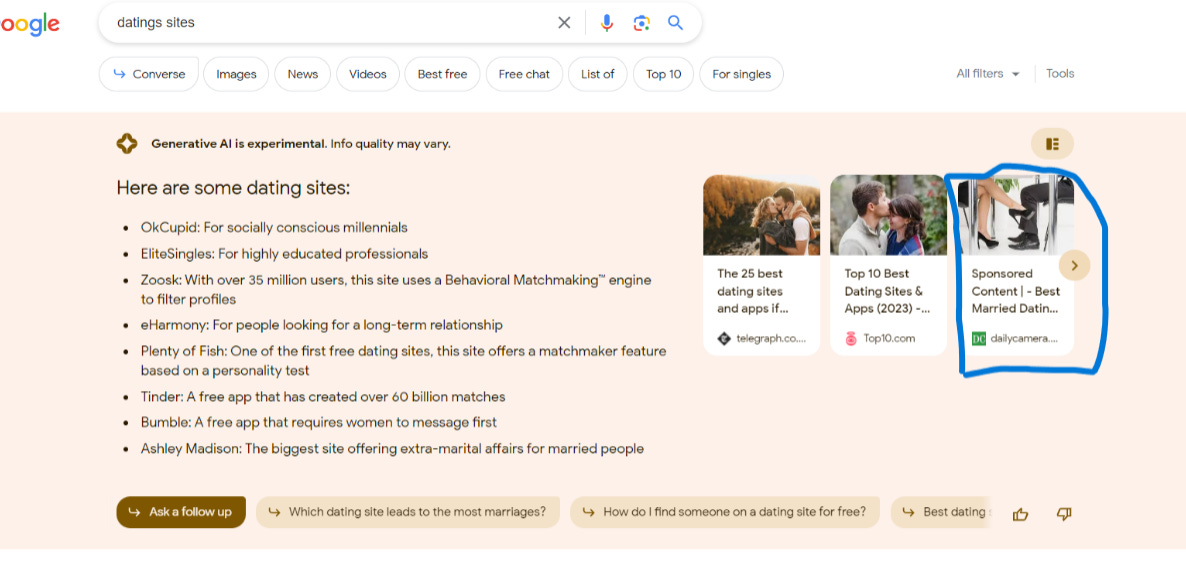I have multiple drafts on how SEO and digital marketing will change now that Google is moving to a generative AI-first experience, but this post will be devoted to sharing only my first thoughts and examples of queries. For the hundreds of you that subscribed to my newsletter over the last week, thank you!
If you are reading this and are not yet subscribed to this newsletter, join the list so you will be notified when those posts come out in the next week or so.
Last week, Google began allowing people on their labs waitlist to begin accessing the new Search Generative Experience that they had previewed at Google I/O event. While I had been expecting the generative experience to be far more impactful than most people anticipated, I too was surprised to find that it was even more prevalent than my worst-case expectations shared here.
Once I was accepted into the labs, I saw the generative experience on any device where I am logged in to Google. Since I use a Google Pixel this also means that my entire mobile experience which is Google-centric is now also underpinned by the generative experience.
From a ratio experience, I see the generative experience on greater than 80% of all queries that I do. Queries for news and stock prices have no generative response at all from my test queries.
For the queries that have generative results, there are one of two options. Either the generative result begins processing immediately when I complete my query or there is an option to choose to generate a response.
I have not yet come across a conclusive pattern of when any of these 3 options will occur. For the most part, there is no generative response on health-related queries, but there are still plenty of queries that do have generative responses. As an example, “alcoholism treatment” does not have a generative response, but “brain tumor” does.
As far as when the option for generative is given vs it happening automatically, on most brand queries I am not seeing automatically generated results, but again there are some where it does.
The option to generate results is even on navigational queries like “Gmail” or “Facebook login”.
Most surprising to me is how many single-word queries have automatically generated results. A query for the word “capital” has a long response of the various meanings of the word. A query for a city, will similarly have a long generative response. For the sort of informational sites that typically drove a lot of organic traffic even in a post-featured snippet world, I think this traffic loss could be fatal for many websites.
Many of the terms that sites like Investopedia and even Wikipedia would typically generate traffic from will now go to a generative response that will more than likely satisfy a user’s need.
However, it’s not just informational sites that will be devastated. Queries for “miami hotels” and even “miami hotel reviews” are going to generative results. This will be highly impactful for travel sites such as Tripadvisor, Kayak and Expedia.
Generative results are not necessarily accurate, but that will be improved certainly before this is more widely available. Another surprise here is that generative results rely on very recent data. Here’s an example for “mortgage rates” that has data from today.
On the topic of mortgages, there is even generative results for a transactional query like “mortgage calculator.”
On a related navigational query for “bank of America claims” there is just an option to generate a result and it is not automatic.
On shopping queries, there are still ads (I am seeing many ad spots replaced by generative boxes), and the generative box appears below those ads. There are even automatic generative results on very broad head shopping terms like “backpack”.
Within those generative results, there is a breakdown with guides for what to buy based on different needs.
As far as sourcing the content, Google does link out to websites, but there may not be any need to click those links since the answer has already been given.
Here’s an example for the query “balance sheet” .
There’s also an option to expand the generative box to see where the data might have been sourced.
Again, this will be cold comfort for the sites that will no longer receive the traffic.
I am not necessarily seeing any sort of correlation between the ranking sites for these queries and those that appear in this box. I have even seen some very non-authoritative pieces of content show up as a source.
For the query “dating sites” the source is a piece of content that was a sponsored post on a site I didn’t recognize.
There will be very few verticals that will not be impacted by generative search. Many queries in the entertainment industry have generative results, but fortunately, on recent shows, Google doesn’t spoil the ending and just gives an option to generate a response. I can’t imagine users would be pleased to see the ending of a popular show when they just wanted to know when it will air.
This is a wrap for the first impressions, and my next posts will be on what this means for marketers and how to act.
To summarize:
Generative results will impact nearly every query
Informational queries will be resolved by generative responses
Shopping queries will begin in a generative box and the organic click might move to mid-funnel
Navigational queries will also be impacted by generative
Generative results are fast and updated frequently
Search has changed forever, but SEO is not dead. Stay tuned for those next posts.














Great read Eli. I look forward to the action steps!